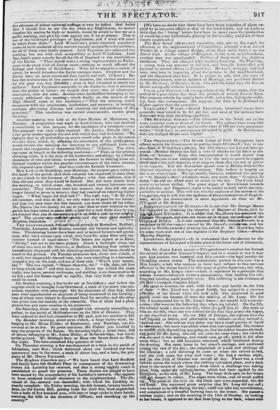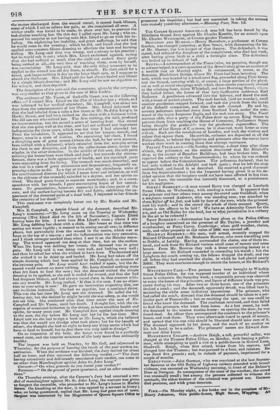Ma Ser..JoliaT . LONG AGAIN.—Th is gentleman's conduct has formed
thesubjeCt. of,atiothet Cormier's inquest, and inn mouth or two it may cost hint another two huadred. amid fifty. pounds—the :legal. penalty for contra artern. The unfortunate patient in. this. case was _a Mrs :Lloyd ; A lady who appears to have heen sobject to that -nervous 'affection ill the throat known by the name of globus hysterieus, but who, accardieg.. to Mr..Long's view—which is regulated. by-a prieciple that Seldom- wavets—laboured under a consumption, thatonothilig hut rub- bing iteut inhelino could possibly mire. The following is ,the evidence. of leashal7d, Cajitain.Lloyde. • ..• . tneeteeto-Londen,•lte said, with his wife and family on; the 15th of -Jailer Mrs. 'Lloyd was in good health, • but subject-to a nervous nffecetifin of the throat when site tpaii...-otd,. She . -ventilated: in -good she becameoill -from time rubbing of Mr: Long.' On the 5t' h,' I accompanied her to Mr. Longs lermee ; site merely Inal asonver- saliarroesileewent on the following day, when, she itthaled... On the 7th, She inhaled again e also on the 8th, when.ihe Introit _She ycent to him on the 0th e when she was rubbed for the urst 'tripe .across the bnent, as she described to me. On the 1001 of October, ahe:told. me that site haefItiteile4 'is before, and aftetwirds wig •rubbede-as they termed at .Site told me that there was hat a small portion of liquid liiaseatiancer, hut more was added when that waseminelided. She. became to. trifiMi while.therulthing aeas pilaw op,. that the ri.k0er became alarmed, Aaetit:iti*:,,Loug,. who did not come for tonne time but•when•he ado-he:said it. was nothing, and would soon ,go off';•livitich it dd after sompe.tfine 'but' an --baa §.ent;:itiou remained, widela)3entimied .daring titOP'oOing. She Came .borne' in • her sister 'a• carriage; and continued inteney.t4e., rest of the day ;. she complained.. of a cold -and chillings all 'the evenin.g; a_Cold shivering.fit came op when she retired to bed, - and the took some hot wine and water; • ebeelialta Testing* night, ..the:-.11M, of, October was day. .. Theee was a vivid rednsees -across the breast where the rubbing; had taken place, .and a dark place its the centre of, the broast ; from which a discharge was taking Awe,. (taint. uptier_Ote cabbageeleaves, which had been _applied by the direortorise as she said, of Mr. Long. The large dark spot on her brans air& .deeper, tedqur, „ The edges avere white,-and allneneb puffed tita.;-Tile pares ef the 'akin on the black; •spot were ;expanded, hutedid &Aire-A': She expressed great surprise that Mr. Long did not call; was inclined to be sitkohning the-day; could not take'•any nourishment, and complained of a dreadful burning heat in the breast. She passed a restless night ; and on the morning of the 12th of October, on looking at her breast, it appeared to me that from lying on her back, where ever
the matter discharged from the wound rested, it caused fresh blisters, some of which I cut to relieve her pain, as she complained all over. A wicker cradle was forced to be made, to place over her, to prevent the bed-clothes touching her. On this day I celled upon Mr. Long ; who ex- pressed his surprise at not having seen Mrs. Lloyd to go on with her in- haling. On explaining her inability, and great sufferings, he said that he would come in the evening ; which he did, and found that she had applied some common blister-dressing to alleviate the heat and burning feeling. Mr. Long .said that was ivrong, and contrary to his practice ; but he would rub it out ; which Mrs. Lloyd exclaimed against, saying that she had suffered so much that she could not endure these parts being rubbed at all—tlse very idea of touching them, even by herself, was excruciating. Mr Long said, that the only thing necessary to be applied to the wound was old dry linen, to absorb. He then asked for a towel, and. began rubbing it dry on the large black spot, as I suppose to absorb the discharge. Mrs. Lloyd said she had always healed any blister by a simple blister-dressing; and Mr. Long said he saw no objection to her using it, and then departed. The description of the sore and the symptoms, given by the surgeons, was very similar to that given in the case of Miss Caddis. The evidence of Mr. Vance, of Sackville Street, was to the following effect.—"1 visited Mrs. Lloyd on the 21st of October last ; which, as I was informed by her medical attendant, Mr. Campbell, was about ten days from the commencesneut of her illness. Mrs. Lloyd informed me that she had inhaled from a tube a few times at Mr. St.John Long's, in Harley Street, and had been rubbed on the chest with a linimeut twice. She did not say who rubbed her. The first subbing, she said, produced mo inconvenience, but the second a sense of burning heat. She stated that she was quite well at the time, and hal not suffered any important indisposition for three years, which was the time I had attended her. From the inhalation, it appeared to me that her tongue, mouth, and fences, were in a state of erosion. On examining her chest, I found a slonghing sore of great extent (where she had, by her own account, been rubbed with a liniment), which extended from the arm-pits across the chest in one direction, and from the collar-bones above, under the nipples, in the other direction. In the middle of this sore, the soft parts covering the breast-bone were black and dead ; but towards the circum- ference, there was a little appearance of health, and the mortified parts were separating from the living. The stomach was much disturbed, and she was in a state of great exhaustion and despondency, frequently' ex- pressing a desire to die. In a (lay or two after my attendance, some of
the constitutional distress (by which I mean fever and irritation, as well ns the sickness of the stomach) subsided in a degree, and her spirits re- vived. The dead parts began to separate more freely; and, in a corre- spondence with her friends, I gave encouraging hopes of her amend- ment. No granulations, however, appearing- in the clean parts of the sore, and the surface having become dry and flabby, exhibiting the Ap- pearance of the dissected parts of a dead body, I imparted to her friends the certainty of her death."
This statement was Completely borne out by Mr. Brodie and Mr. Campbell.
Mrs. E. Campbell, a female friend of the deceased, described Mr. Long's treatment.—“ Me. Long mune on the Tuesday or Wednesday evening (Mr*: Lloyd died on the 8th of November) Captain LiOd Laving been for him. I went into Mrs. Lloyd's room ; where I stew Mr. Long dabbing her chest with a cloth. Her breast at that time Was oozing out water rapidly; it seemed to be oozing out all over, in different places, but particularly from the wound in the centre, which was as large as the top of a tea-cup ; and the inflammation was very extensive, and I think stronger marked than when I saw it on the Monday morn. sag. The wound appeared not deep at that time, but on the surface. When Mr. Long was dabbineb her breast, the deceased was in great pain. Mr. Long said it was doing very well, and looking very well ; and then he asked her what she wished to have done. The deceased said she wished it to be dried up and healed. Mr. Long had taken off the simple dressing which had been applied by Mr. Campbell, on account of the extreme pain. Mr. Long would have rubbed it again, but the de- ceased would endure no more rubbing. Mr. Long directed nothing more than dry linen to heal the sore ; but the deceased wished the simple dressing to be applied, as she said it cooled the wound, and that she had had frequent blisters, and had always cured them in that manner with. out any trouble. Mr. Long replied, If that is the case, I see no objec- tion to your using it now.' He gave no instruction respecting diet, nor any medicine internally. She had no appetite, but a continual thirst. This was the lest time Mr. Long saw the deceased. He called the fol- lowing day, but she desired he might be told she was asleep, as she would not see him. She continued after that time under the care of Mr. Campbell and Mr. Vance, until her death. I thought her, with the ex- ception of occasional irritation in the throat, to have excellent health and spirits, for many years past. Mr. Campbell first applied simple dressing to the sore, the day before Mr. Long saw her fir the last time. Mrs Lloyd told me she had to sign a book at Mr. Long's, which she believed -was that she would not divulge what took place ; but for the benefit of others, she thought she had no right to keep any thing secret which had been so fatal to herself, but infect there was very little to divulge."
On an inspection of the body, the lungs were found in a perfectly sound state, and the interior structure of the body more than ordinarily healthy.
'The inquest was held on Monday, by Mr. Gell, and adjourned to Thursday, for the purpose of hearing Le result of the post mortem ex- amination. When the evidence was finished, the Jury retired for about half an hour, and then returned, the following verdict :—" The Jury having attentively and deliberately considered their verdict, can come to no other than Manslaughter against John St. John Long."
• Coroner—" On what grounds do you found your verdict ?" • Foreman—" On the ground of gross ignorance, and on other considera- tions."
On Thursday evening, after the Coroner's Jury had returned a ver- dict of manslaughter against Mr. St. John Long' the warrant was given to Sargent the constable, who proceeded to Mr. Long's house in Harley Street. On knocking at the door, it was opened by a servant in livery ; who, on being questioned, replied that Mr. Long had gone out of town. anent was instructed by the Magistrates of Queen Square Office to
prosecute his inquiries ; but had not succeeded in taking the accused into custody yesterday afternoon.—Morning Post, Nov. 13.



























 Previous page
Previous page